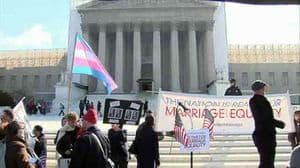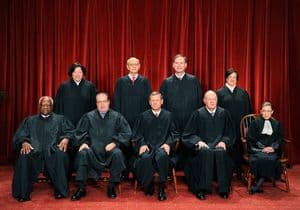 For three hours over two days, the Supreme Court discussed the freedom to marry. The justices asked questions about the law of the love after recent polling showed that 58 % of Americans, and a slew of moderate-to-conservative politicians, supported equality. This trend caught the attention of an unusually ascerbic Chief Justice, who said that leaders were "falling over themselves" to support gay rights. His convenient ignorance of the litany of burdens and discriminations we face every day, his insensitivity and willful ignorance of the plight of sexual minorities, and Roberta Kaplan's inadequate response to his flippancy should not damper the euphoric feeling that what happened this week was historic. The freedom to marry had a hearing at the Supreme Court, where the shallowness of discrimination was laid bare for the world to see. As we await favorable decisions in June, the world is a different place today than it was on Monday.
For three hours over two days, the Supreme Court discussed the freedom to marry. The justices asked questions about the law of the love after recent polling showed that 58 % of Americans, and a slew of moderate-to-conservative politicians, supported equality. This trend caught the attention of an unusually ascerbic Chief Justice, who said that leaders were "falling over themselves" to support gay rights. His convenient ignorance of the litany of burdens and discriminations we face every day, his insensitivity and willful ignorance of the plight of sexual minorities, and Roberta Kaplan's inadequate response to his flippancy should not damper the euphoric feeling that what happened this week was historic. The freedom to marry had a hearing at the Supreme Court, where the shallowness of discrimination was laid bare for the world to see. As we await favorable decisions in June, the world is a different place today than it was on Monday.
Many media are making conclusions about the end of DOMA, a narrow standing decision in the Prop 8 case, and the end of the culture wars with a victory for gay rights. Some of these predictions may turn out to be right, but we can't know that and it misses the true legal and political lessons from the last two days.
Having already offered detailed summaries and initial analysis of the Prop 8 (Part 1 and Part 2) and DOMA hearings (Part 1 and Part 2), I would like to take a step back and think more broadly. Here are the seven takeaways from Marriage Week at the Supreme Court.
1. The bench was "hot," asking lots of questions, but don't read too much into those questions.
Just because a justice asks a question critiquing one side's argument does not necessarily point to his or her ultimate decision. Judges play the devil's advocate for many reasons other than preening. If these cases were so open and shut, there would be no need for briefs, reply briefs, and oral argument; neither side ever has a perfect case. Therefore, the justices need to probe the logical, legal, and policy problems, not only to help them decide the case but also to determine the best way to decide the ultimate question. Oral argument questions are also just as much about persuading colleagues as challenging attorneys. Justice Ginsburg may have thought of something that the Chief Justice missed, or vice versa; Justice Sotomayor's demand that Paul Clement give her a single reason for discriminating against gay couples, and his inability to do so, may have worried the Chief and Justices Kennedy and Alito about siding with an impossibly weak argument.
SIX ADDITIONAL TAKEAWAYS, AFTER THE JUMP…
2. That we didn't see as many questions about equality as we thought, and a lot more questions about standing and jurisdiction, does not mean DOMA and Prop 8 will live or die on less sexy issues like standing or federalism.
We have to be cautious using questions to determine where the justices are leaning. Justice Kennedy's failure to ask a lot of questions about equality and due process, except to worry about Ted Olson's broad proposed holding, may mean that he simply had no questions about that area of law, that the legal issues were pretty clear, and that no amount of oral argument was necessary to get to clarify this or that point about the Equal Protection claim.
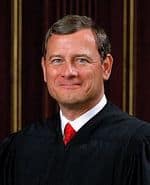 3. The gay community's very recent political success could be used as a cudgel against vindication at court, but that would require willful ignorance of history and law.
3. The gay community's very recent political success could be used as a cudgel against vindication at court, but that would require willful ignorance of history and law.
The Chief Justice was uncharacteristically flippant when he said that politicians were "falling over themselves" to support the freedom to marry. Justice Scalia was characteristically nasty when he referred to our community's political power. No one has to be politically powerless in order to have his rights vindicated in a court of law, but it took several questions from the Court's liberal wing to remind their conservative colleagues. Winning over 58% of the population and Rob Portman and Kay Hagan are great, and those successes may portend many more in the future, but harping on these recent changes in political winds ignore longstanding discrimination, ongoing bias (see, e.g., Kentucky), and the continuing burdens imposed on us by constitutional marriage bans in the states.
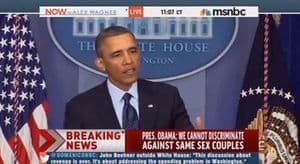 4. A few of the Court's conservatives were pissed, venting frustration at the President. They vented because there wasn't anything they could do about it.
4. A few of the Court's conservatives were pissed, venting frustration at the President. They vented because there wasn't anything they could do about it.
The Chief Justice said the President lacked "the courage of his convictions" for continuing to enforce DOMA while believing it unconstitutional. Justices Kennedy and Scalia harped on the unique Administration maneuvers that brough the DOMA case to the Court: the Administration first defending, then declining to defend, then switching sides, winning, and still appealing.
This was among the more ridiculous lines of questioning of Marriage Week. What would the Chief have the President do? Declare a duly enacted law and stop enforcing it, completely ignoring his responsibilities? Had the President done that, I bet we could count on one hand the number of seconds before the Republican House wrote up articles of impeachment. And, as Justice Alito pointed out, since the federal government is still on the hook for Edie Windsor's $350,000 estate tax bill, it has been injured regardless of the legal position it takes on DOMA. So, what the Administration did was unusual, but it did not deprive the Court of jurisdiction.
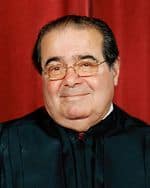 5. What the conservatives really want is judicial abdication in the face of the political process… Well, at least when it comes to gay rights.
5. What the conservatives really want is judicial abdication in the face of the political process… Well, at least when it comes to gay rights.
The Court's conservatives were also probably a little pissed because the world is passing them by. Justices Scalia and Thomas have been clear about their distaste for anything gay, and the social conservatism of President Bush's nominees, the Chief Justice and Justice Alito, were obvious during their confirmation hearings and their tenures as judges. So, they couched their skepticism about gays marrying in backhanded compliments about our recent political successes. Both Charles Cooper, the attorney for the Prop 8 Proponents, and Paul Clement, the attorney for House Republicans, picked up on this and concluded their remarks with pleas for letting the political process, which they conceded gays are winning, play out without judicial intervention.
This is just the most recent example of what conservative lawyers have inconsistently wanted since the 1960s: judicial abdication. Diatribes against so-called "activist judges" and calls for the absolute supremacy of the political branches are really products of conservative disrespect for the judiciary's leadership expanding individual rights at the expense of traditional authority. Of course, that abdication turns activist when conservatives want to overturn a progressive law (see, Obamacare, campaign finance regulations, the Civil Rights Act). In the political process, conservatives can mislead, strike fear in voters, and also stop people from voting; in a courtroom, the hollowness of their arguments are shown the light.
But setting aside conservatives' biased manipulation of legal doctrine, the plea for abdication in this case is nothing less than a direct threat to democratic institutions. They talk about it like they respect democracy: You judges are unelected, let the people decide. In fact, that idea challenges the co-equality of the judicial branch and courts' role in preventing mobs of voters from discriminating against people they don't like. Liberty is not just whatever the people say, even if they're saying something you like.
The stars of Marriage Week at the Supreme Court were Justices Ginsburg, Sotomayor, and Kagan; Edie Windsor, Kris Perry, and Sandy Stier, of course; and, though she was a spectator at One First Street, Mary Bonauto. Yes, Ted Olson and David Boies got laudatory headlines, and Jeff Zarrillo and Paul Katami have sacrificed so much for their community. But, this week we were reminded why we need more women on the Court.
Justice Sotomayor eviscerated anti-gay discrimination in under one minute. Justice Kagan was Paul Clement's sharpest questioner, pointing out his lies about why DOMA was passed. And, no one will forget Justice Ginsburg's "skim milk marriages" comment. These three lions of the law showed their unwavering support for equality.
But, one woman didn't get a lot of press or the chance to swat back at Scalia's nasty tone and misreading of the law. Mary Bonauto (pictured), the legal eagle of the Gay and Lesbian Advocates and Defenders (GLAD), is the dean of our community's lawyers. She has been arguing (and winning) gay rights cases in the federal courts for longer than some of us have been alive and was the counsel of record in another DOMA case, Gill v. OPM. Along with people like Jon Davidson at Lambda Legal, Ms. Bonauto is responsible for more gay rights advances than anyone else. Roberta Kaplan, Edie Windsor's attorney, did a fine job in a tough position, and I don't join the several liberal critics who think she dropped the ball. Let's just not forget that Ms. Bonauto probably made all this possible.
Media are "falling over themselves" to declare the freedom to marry inevitable, even if the Supreme Court makes the wrong decision in June. Even conservatives like Charles Cooper and Paul Clement think it's inevitable. Don't fall for this trick. If the hearing at the Supreme Court has the effect of elevating our struggle for rights and highlighting the emptiness and hate of the opposition, an unfavorable decision in June will hurt. Sure, it will hurt the Court's esteem in the eyes of a public that is happy with a man marrying the man he loves, but it will hurt us more.
Thanks to the 2004 election, we have many state constitutional provisions banning gay marriage. Each unfavorable or narrow Supreme Court decision on the freedom to marry not only leaves those in place to continue harming gay couples across the country, but unhelpful decisions tossing Prop 8 on standing or tossing Windsor on jurisdiction deprives us of strong precedent for equality that could be used in the next case. Without Romer, without Lawrence, there would be no Windsor or Hollingsworth. We need the latter two to be better, stronger, more direct in their support for freedom, love, and equality.
***
Ari Ezra Waldman teaches at Brooklyn Law School and is concurrently getting his PhD at Columbia University in New York City. He is a 2002 graduate of Harvard College and a 2005 graduate of Harvard Law School. His research focuses on technology, privacy, speech, and gay rights. Ari will be writing weekly posts on law and various LGBT issues. You can follow him on Twitter at @ariezrawaldman.

